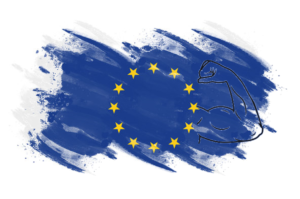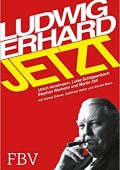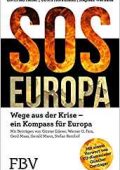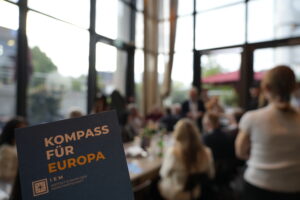Markt, Freiheit und Innovation!
Wie viel „Ludwig Erhard“ war das?
Der sogenannte „Ludwig-Erhard-Gipfel“ 2023 fand vom 3. bis 4. Mai 2023 am Tegernsee bei München statt. Gmund am Tegernsee war bekanntlich die Wahlheimat von Ludwig Erhard, der in Fürth geboren wurde (siehe LEZ www.ludwig-erhard-zentrum.de). Ihm zu Ehren findet seit 2017 jährlich ein Gipfeltreffen der Weimer Mediengruppe am Tegernsee statt.
Der Flyer für den diesjährigen Gipfel stellte die zentrale Frage: Kommt nach Krieg und Krisen das neue Wirtschaftswunder?
(Anmerkung: Ludwig Erhard mochte den Begriff „Wirtschaftswunder“ nicht. Er würdigte dagegen gern die volkswirtschaftliche Leistung, die durch einen liberalen Staat ermöglicht wurde. Die „wundergläubigen“ Deutschen sahen in ihm einen Talisman. Der Begriff „Wirtschaftswunder“ stand noch in der NS-Tradition. In den 30er Jahren gab es auch schon (vermeintlich) ein Wirtschaftswunder, das auch so bezeichnet wurde. Es war durch Staatsverschuldung und Rüstungsinvestitionen verursacht. Vermutlich mochte auch deswegen Erhard diesen Begriff nicht).
Wer hier konkrete Antworten erwartete, wurde sicher enttäuscht. Auch wer neue Einsichten zu Ludwig Erhard gewinnen wollte, kam wohl nicht auf seine Kosten.
Wer allerdings etwas von Meinungsführern aus Politik und Wirtschaft, insbesondere von den Unternehmen, die das Event förderten, hören wollte, war hier richtig (Kooperationspartner waren die Deutsche Telekom, Audi, flatexDEGIRO, Sanofi, EY, BAT Germany, ntv u.a., siehe Internetseitehttps://ludwig-erhard-gipfel.de/). Natürlich geht es auch um Selbstinszenierungen und um die Erweiterung der persönlichen Netzwerke. Dafür boten die Pausen, der Staatsempfang am Dienstag (2.5.) und die Gipfel-Nacht (4.5.) gute Gelegenheiten.
Wie von Teilnehmern berichtet wurde, war der erste Gipfeltag, der sogenannte „Future & Finance Day“ (am 3.5.) schon stark vom Landtagswahlkampf in Bayern mitbeeinflusst. Dr. Markus Söder, Ilse Aigner, Dr. Theo Waigel, Hubert Aiwanger, Alexander Dobrindt waren u.a. zu Gast und wurden exklusiv befragt. Dazwischen gab es Diskussionsrunden zur Wirtschafts- und Geldpolitik sowie zu Fragen der Digitalisierung und Behauptung in einem technologisch anspruchsvolleren Umfeld.
Unbestritten ist, dass Europa einen massiven Nachholbedarf gegenüber China und den USA hat.
Der zweite Gipfeltag (am 4.5.) war der „Innovation & Science Day“. In ökonomischer Hinsicht ging es um die Zukunft der Banken, Energiesicherung und grüne Mobilität (auf dem Freigelände war z.B. ein Stand der Fa. Ottobahn. Nach dem Vorbild der Wuppertaler Schwebebahn soll ein vollautomatischer Personentransport für Städte ermöglicht werden). Darüber hinaus waren Gesundheitsthemen im Fokus. Noch am nächsten Erhardnah war die Diskussionsrunde 126 Jahre Ludwig Erhard – Präsentiert von Markt und Mittelstand. Insbesondere Dr. Carsten Linnemann und Frank Thelen lieferten überzeugende Beiträge. Erfreulicherweise folgten die Teilnehmer nicht dem sonst üblichen Infotainment-Stil. Sie redeten Klartext. So fehlt es an Risikobereitschaft. Eine Kultur, Scheitern zuzulassen wie in den USA gibt es nicht. Die Finanzierungslandschaft ist unterirdisch schlecht. Es gibt dagegen viele „Fördertöpfe“. Wer sie anzapfen will, wird selbst zum Bürokraten und verliert wertvolle Zeit für den Aufbau des jungen Unternehmens.
Auch am Innovation & Science Day trug viel politische Prominenz vor, so u.a. S.D. Erbprinz Alois von und zu Liechtenstein, Markus Ferber, Julia Klöckner (sehr engagiert und mit viel Beifall bedacht), Dr. Carsten Linnemann, Lars Klingbeil, Christian Lindner, Nicola Beer, Ricarda Lang und Friedrich Merz. Politische Höhepunkte waren die Verleihung des Freiheitspreises der Medien an Garri Kasparow und die „Elefantenrunde“ der Parteichefs von SPD, FDP, Bündnis 90/Die Grünen und CDU.
Übergreifend wurde das staatliche Handeln kritisch hinterfragt. Hohe Steuern und gleichzeitiges umfassendes Fördern passen nicht. Das ist eher Staatswirtschaft. Solche dirigistische Lenkungsmaßnahmen passen nicht zu einer Marktwirtschaft, die sich auf Erhard berufen könnte. Das tut die aktuelle Bundesregierung auch nicht. Sie vertritt weitgehend planwirtschaftliche Ansätze ohne Konsumentensouveränität. Sie setzt dreist auf Verbote, die auch die FDP nicht verhindern kann. Es ist eine Anti-Erhard-Koalition. Sie ist typisch deutsch bevormundend, kleinkariert und vom Gedanken beseelt, mit deutschen Windmühlen und Solarmodulen die Welt zu retten.
In der Elefantenrunde wurden die ordnungspolitischen Gemeinsamkeiten von Friedrich Merz und Christian Lindner deutlich. Ricarda Lang überzeugte fachlich nicht. Über die Beschreibung der Klimaziele kam sie kaum hinaus. Ludwig Erhard schien ihr weitgehend unbekannt. Auch Lars Klingbeil bezog sich nicht nennenswert auf ihn. Ludwig Erhard sitzt derzeit auf den Oppositionsbänken. Die Berliner Funktionärsschickeria braucht ihn nicht. Seine Lehren wären zu unbequem, vor allem für Politiker machtbegrenzend.
Christian Lindner mühte sich in der Diskussionsrunde redlich. Er kann sich in der Ampel-Koalition aber nicht durchsetzen. De facto ist er auch schon Opposition (Anmerkung: im Gegensatz zur früheren APO nicht nur parlamentarische Opposition, sondern regierungsinterne Opposition und letztlich nur ein „Feigenblatt“). Friedrich Merz von der CDU ist der führende Vertreter der parlamentarischen Opposition. Auch wenn eine Wende dringend erforderlich erscheint, die Rahmenbedingungen dafür sind schlecht. Eine Koalition ordnungspolitischer Vernunft aus CDU/CSU und FDP – falls überhaupt rechnerisch nach der nächsten Bundestagswahl möglich – könnte schnell scheitern. Der nicht anwesende Elefant im Raum war die AfD. Sie kommt nach Umfragen auf fast so viele Stimmen wie die SPD. Ricarda Lang hat unfassbare Sorgen wegen der AfD. Aber was tut sie dagegen? Was macht die SPD? U.E. machen die Grünen und die ohne Werte agierende SPD (Anmerkung: Wer sich über die SPD informieren will, sollte das Buch „Die Moskau-Connection: Das Schröder-Netzwerk und Deutschlands Weg in die Abhängigkeit“ von Reinhard Bingener und Markus Wehner lesen) sozialistische Gesinnungspolitik, die mit den mit viel PR- vorgetragenen Klimazielen verschleiert wird. Bei einer solchen Konstellation ist eine notwendige Erneuerung schwierig.
Fazit: Wer etwas über Erhard lernen will, sollte den Gipfel meiden (ein „Wirtschaftswunder“ wird vermutlich nicht kommen und Erhard hätte es so nicht bezeichnet, siehe oben).
Auch ein „deutsche Davos“ ist der Gipfel nicht. Da werden u.E. falsche Erwartungen geweckt. Wer aber den „Zeitgeist“ mit all seinen Verirrungen und die Selbstinszenierungen der Politiker und der Sponsoringunternehmen erleben will, ist gut aufgehoben. Die politische Debatte am Ende war sogar analytisch nicht unwichtig. Problem erkannt, aber die Lösung bleibt weiter offen. Ohne Lernen und echte Innovationsfreude und ohne einen funktionierenden Kapitalmarkt bleiben Deutschland und Europa in der Welt aufstrebender Mächte immer unwichtiger.
Die Zeit läuft uns weg. Das gilt derzeit vor allem für die Sicherheit. Sowohl Friedrich Merz und Christian Lindner wiesen auf die notwendige Sicherung der Außengrenzen der EU hin. Völlig richtig. Das gilt nicht nur wegen der illegalen Migration, sondern auch militärisch. Der Krieg in der Ukraine ist auch für Europa ein Warnsignal, gemeinsam verteidigungsbereit zu werden. Ein Europa des Freihandels, offener Märkte und eins, dass auch die Briten wieder miteinschließt, wäre schon ein erster Weg. Im Energiebereich hat die Bundesregierung versagt, dies sollte ohnehin europäisch gelöst werden.
Das könnte ein gutes Ergebnis des Gipfels sein, dass wir vom IEM gerne aufgreifen. Wir brauchen konkretere Maßnahmen, so u.E. eine
neue europäische Zukunfts-Initiative in turbulenten Zeiten:
In diesen disruptiven, volatilen und tabubrechenden Zeiten braucht es
- Stabile Rahmenbedingungen = regulierte soziale Marktwirtschaft in ganz Europa, fairen Wettbewerb, keine Monopolstrukturen
- Möglichst wenig lenkende Eingriffe vom „Vater Staat“: Corona, Energiepreise, Klimawechsel und der Angriffskrieg haben die Schwächen gnadenlos aufgezeigt, statt dessen:
- Mitmachen, Anreizsysteme und Toleranz für andersartige Innovationen schaffen, alternative technologische Lösungen zulassen
- eine neue Gründerzeit in ganz Europa ist der beste Weg, oder wir werden zum Industriemuseum abhängig von China und USA
- Forscher und Gründer von heute sind die Unternehmer von morgen
- Sie brauchen Kapitalmarkt- und Start-up Förderungen, Bürokratieabbau und Steuererleichterungen
- Wir brauchen eine neue europäische Zukunfts-Initiative in turbulenten Zeiten
Stephan Werhahn, Vorstand des IEM und
Dr. Ulrich Horstmann, Vorstandsmitglied IEM

Market, freedom and innovation!
How much “Ludwig Erhard” was that?
The 2023 so-called “Ludwig Erhard Summit” took place from May 3th to 4th, 2023 at Lake Tegernsee near Munich. Gmund am Tegernsee is known to have been the adopted home of Ludwig Erhard, who was born in Fürth (see LEZ www.ludwig-erhard-zentrum.de). To his honour, an annual summit of the Weimer Media Group has been held at Tegernsee since 2017.
The flyer for this year’s summit stated the central question:
Is a new economic miracle coming after war and crises?
Note: Ludwig Erhard did not like the term „economic miracle“. On the other hand, he liked to pay tribute to the economic achievement made possible by a liberal state. The „miracle-believing“ Germans saw in him a talisman. The term „economic miracle“ was still in the Nazi tradition. In the 1930s there was also already (supposedly) an economic miracle, which was also called that. It was caused by national debt and armament investments. That is probably why Erhard did not like this term.
Anyone expecting concrete answers here, was sure to be disappointed. Those who wanted to gain new insights into Ludwig Erhard also probably did not get their money’s worth.
But those who wanted to hear from German opinion leaders from politics and business, especially from the companies that sponsored the event, were in the right place (cooperation partners were Deutsche Telekom, Audi, flatexDEGIRO, Sanofi, EY, BAT Germany, ntv and others, see websitehttps://ludwig-erhard-gipfel.de/). Of course, it is also about self-dramatisation and expanding personal networks. The breaks, the state reception on Tuesday (2.5.) and the summit night (4.5.) offered good opportunities for this.
As participants reported, the first day of the Summit, the so-called „Future & Finance Day“ (on 3.5.) was already pretty local, because strongly influenced by the state election campaign in Bavaria: Dr. Markus Söder, Ilse Aigner, Dr. Theo Waigel, Hubert Aiwanger, Alexander Dobrindt and others were guests and were interviewed exclusively.
In between, there were discussion rounds on economic and monetary policy as well as on questions of digitalisation and asserting oneself in a technologically more demanding environment.
It is undisputed that Europe has a massive need to catch up with China and the USA.
The second day of the summit (on May 4th) was the „Innovation & Science Day“. From an economic point of view, it was about the future of banks, energy security and green mobility (on the open-air site, for example, there was a stand of the company Ottobahn. Based on the model of the Wuppertal suspension railway, a fully automatic passenger transport system for cities is to be made possible). In addition, health topics were in focus.
Still closest to Erhard was the panel discussion 126 Years of Ludwig Erhard – Presented by Markt und Mittelstand. Dr. Carsten Linnemann and Frank Thelen in particular made convincing contributions. Fortunately, the participants did not follow the usual infotainment style. They spoke plainly. There is a lack of willingness to take risks. There is no culture of allowing failure like in the USA.
The funding landscape for start-ups is very bad indeed. On the other hand, there are many „funding pots“. Those who want to tap into them become bureaucrats themselves and lose valuable time for building up the young company.
A lot of German political VIPs also spoke at the Innovation & Science Day, including H.S.H. Hereditary Prince Alois von und zu Liechtenstein, Markus Ferber, Julia Klöckner (very committed and received a lot of applause), Dr. Carsten Linnemann, Lars Klingbeil, Christian Lindner, Nicola Beer, Ricarda Lang and Friedrich Merz. Political highlights were the awarding of the Freedom of the Media Prize to Garri Kasparov and the „elephant round“ of the party leaders of SPD, FDP, Bündnis 90/Die Grünen and CDU.
Across the board, state action was critically questioned. High taxes and comprehensive subsidies at the same time do not fit. That is more like a state economy. Such dirigistic steering measures do not fit in with a market economy that could invoke Erhard.
Neither does the current federal government. It advocates largely planned economic approaches without consumer sovereignty. It brazenly relies on bans, which even the FDP cannot prevent. It is an anti-Erhard coalition. It is typically German patronising, small-minded and inspired by the idea of saving the world with German windmills and solar panels.
In the elephant round, the regulatory common ground between Friedrich Merz and Christian Lindner became clear. Ricarda Lang was not convincing from a technical point of view. She hardly got beyond describing the climate goals. Ludwig Erhard seemed largely unknown to her. Lars Klingbeil did not refer to him in any significant way either. Ludwig Erhard is currently sitting on the opposition benches. The Berlin functionary chic doesn’t need him. His teachings would be too uncomfortable, especially for politicians power-limiting.
Christian Lindner made an honest effort in the discussion round. But he cannot assert himself in the traffic light coalition. De facto, he is also already opposition (note: in contrast to the former APO, not only parliamentary opposition, but opposition within the government and ultimately only a „fig leaf“).
Friedrich Merz of the CDU is the leading representative of the parliamentary opposition. Even if a turnaround seems urgently needed, the framework conditions for it are poor. A coalition of CDU/CSU and FDP that is reasonable in terms of regulatory policy – if at all mathematically possible after the next federal election – could quickly fail.
The elephant in the room that was not present was the AfD. According to polls, it has almost as many votes as the SPD. Ricarda Lang is incredibly worried about the AfD. But what is she doing about it? What is the SPD doing? In our opinion, the Greens and the SPD are acting without values (note: if you want to know more about the SPD, you should read the book „Die Moskau-Connection: Das Schröder-Netzwerk und Deutschlands Weg in die Abhängigkeit“ , The Moscow Connection: The Schröder Network and Germany’s Path to Dependency by Reinhard Bingener and Markus Wehner).
In our opinion, the Greens and the SPD are pursuing socialist mindset politics, which is disguised by the climate goals presented with a lot of PR. With such a constellation, a necessary renewal is difficult.
Conclusion:
Anyone who wants to learn something about Ludwig Erhard must not attend this summit,
an „economic miracle“ will probably not come and Erhard would not have called it that, see above.
Nor is the summit a „German Davos“. In our opinion, it raises false expectations.
But if you want to experience the „zeitgeist“ with all its aberrations and the self-dramatisation of politicians and sponsoring companies, you are in good hands.
The political debate at the end was even analytically not unimportant. Problem recognised, but the solution remains open.
Without learning and real innovative spirit and without a functioning capital market, Germany and Europe will remain increasingly unimportant in the world of emerging powers.
Time for a stable and prosperous Europe is running out. This is especially true of security at the moment. Both Friedrich Merz and Christian Lindner pointed to the need to secure the EU’s external borders. Absolutely right.
This is true not only because of illegal migration, but also militarily. The war in Ukraine is also a warning signal for Europe to become jointly ready to defend itself.
A Europe of free trade, open markets and one that also includes the British again would be a first step. The German government has failed in the energy sector, which should be solved at the European level anyway.
This could have been good results of the summit, which we at the IEM would like to take up. We need more concrete measures to develop further our European market, such as, for example a new European initiative for the future in turbulent times:
In these disruptive, volatile and taboo-breaking times we need
- Stable framework conditions = regulated social market economy throughout Europe, fair competition, no monopoly structures
- As little steering intervention as possible from „father state“:
Corona, energy prices, climate change and the war of aggression have mercilessly revealed the weaknesses, instead: - Participate, create incentive systems and tolerance for different kinds of innovation, allow alternative technological solutions.
- A new start-up era throughout Europe is the best way forward, or we will become an industrial museum dependent on China and the USA
- Be aware: today’s researchers and founders are tomorrow’s entrepreneurs.
- They need capital market and start-up support, bureaucracy reduction and tax relief
- We need a new European initiative for the future of our European market in such turbulent times
With best wishes
Your IEM-Team






